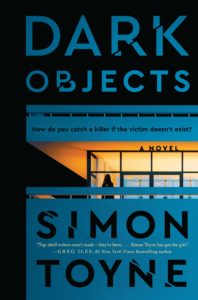Soon after a body is found at a bizarre and brutal murder scene in London, we discover what the title of this police procedural refers to. The dark objects are the “overturned and sometimes overlooked” things at a murder that may explain what happened.
However, one of the objects laid out in ritual fashion near the victim is anything but overlooked. In fact, it’s a blaring message. This object is a book about how to “read” murder scenes, written by Laughton Rees, the police commissioner’s long-estranged daughter. Rees is a criminologist with “almost preternatural abilities to observe, process, and recall information.” In her university lectures, she only uses cold cases or solved cases, but she’s pulled into investigating this murder case at an ultra-chic, multi-million-pound home because of that book.
The discovery of her book opens up a whirlpool of grief and misery because years ago, her father led a high-profile investigation whose suspect ended up killing her mother. And she saw it happen. Rees blames her father, rejected all his offers of connection and has become obsessive compulsive to cope with her trauma. She’s a deeply sympathetic character because it seems that her dark past “always catches up with her and swallows her whole, no matter how fast or how fast or how far she runs from it.”
Rees’s “partner” in the investigation is the resonantly-named inspector Tannahill Khan, but he’s not nearly as interesting as her or the sleazy reporter, Brian Slade, who will do anything to get a story with long legs into the tabloid he writes for.
The book’s strength is the detailed and fascinating police work and the focus on Rees’s suffering and attempts to stay stable, though a few things get in the way, including the slow pace.
It seems obligatory these days that any major figure in a mystery or TV crime series is the parent of a troubled teenager and Dark Objects checks off that box in spades.
The writing could also have been more polished to avoid various kinds of repetition and lines like this one: “Tannahill watches, his brain trying to catch up with what just happened.” Then there’s the awkward and unattractive mix of fonts and spacing at various points.
None of that truly damages the book and the fault lies with the editing and design, not the author. A bigger issue is the trick ending with a wildly unbelievable confession.
All the same, filled with biting social commentary, Dark Objects has enough for police procedural fans to enjoy on a few hot summer nights.
Lev Raphael was the long-time crime fiction reviewer for The Detroit Free Press and is the author of ten crime novels.

